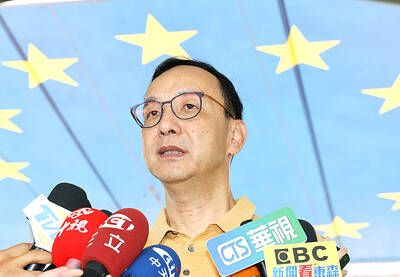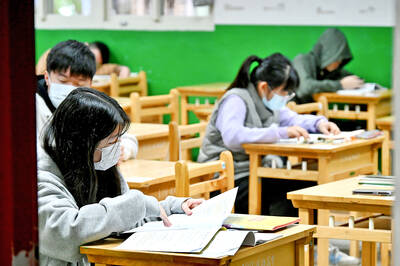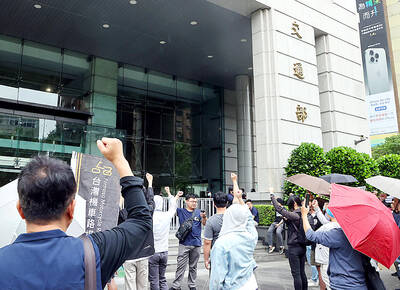Premier Su Tseng-chang (蘇貞昌) yesterday welcomed nine international experts to the opening of a week of meetings to review Taiwan’s implementation of two UN human rights covenants.
The meetings are also to involve government agencies and civil society groups. They were organized by the Ministry of Justice and the Executive Yuan to provide input and recommendations regarding the nation’s implementation of the International Covenant on Civil and Political Rights, and the International Covenant on Economic, Social and Cultural Rights.
Su touted Taiwan’s achievements over the past few years, saying it was the first nation in Asia to legalize same-sex marriage in 2019, and has striven to pass laws to better protect the rights of migrant workers, including foreign fishers on ocean-going vessels.

Photo: CNA
The government aims to end inequality and discrimination, and is working on new policies to protect people’s digital and environmental rights, he said.
Su reminded the audience that in the recent past, Taiwan was not a free, open society like many other advanced nations.
“It was only 35 years ago that we were living under martial law, [involving] oppressive rule by an authoritarian regime,” Su said.
“Many sacrificed their lives, while others spent their youth shedding blood and tears to attain our democratic society,” he said, adding that this is why Taiwanese cherish their hard-fought freedom and human rights, and the nation would endeavor to safeguard these rights.
However, Taiwan now faces a powerful neighbor that is threatening to annex it, Su added.
Recommendations from past reviews have gradually been adopted, such as establishing the National Human Rights Commission in 2020, launching the “national human rights action plan” under the Ministry of Justice and setting up an office for human rights and transitional justice under the Executive Yuan late this year, he said.
The nine international experts attending the review include Manfred Nowak of Austria, a former UN special rapporteur on torture; Eibe Riedel of Germany, a former vice chairman of the UN Committee on Economic, Social and Cultural Rights; William Schabas of Canada, who has been described as “the world expert on the law of genocide and international law”; and Indigenous Peoples Alliance of the Archipelago secretary-general Rukka Sombolinggi of Indonesia.
Control Yuan President Chen Chu (陳菊) pointed to the review as proof of Taiwan’s willingness to improve on human rights and civil liberties, while respecting the rights of minority groups in a multicultural society, and its willingness to link up with the world, despite not being a member of the UN.
Taiwan is later this year to conduct reviews on UN conventions, including the Convention on the Elimination of All Forms of Discrimination Against Women, the Convention on the Rights of the Child, and the Convention on the Rights of Persons with Disabilities, she added.

GOOD DIPLOMACY: The KMT has maintained close contact with representative offices in Taiwan and had extended an invitation to Russia as well, the KMT said The Chinese Nationalist Party (KMT) would “appropriately handle” the fallout from an invitation it had extended to Russia’s representative to Taipei to attend its international banquet last month, KMT Chairman Eric Chu (朱立倫) said yesterday. US and EU representatives in Taiwan boycotted the event, and only later agreed to attend after the KMT rescinded its invitation to the Russian representative. The KMT has maintained long-term close contact with all representative offices and embassies in Taiwan, and had extended the invitation as a practice of good diplomacy, Chu said. “Some EU countries have expressed their opinions of Russia, and the KMT respects that,” he

CHANGES: After-school tutoring periods, extracurricular activities during vacations or after-school study periods must not be used to teach new material, the ministry said The Ministry of Education yesterday announced new rules that would ban giving tests to most elementary and junior-high school students during morning study and afternoon rest periods. The amendments to regulations governing public education at elementary schools and junior high schools are to be implemented on Aug. 1. The revised rules stipulate that schools are forbidden to use after-school tutoring periods, extracurricular activities during summer or winter vacation or after-school study periods to teach new course material. In addition, schools would be prohibited from giving tests or exams to students in grades one to eight during morning study and afternoon break periods, the

Advocates of the rights of motorcycle and scooter riders yesterday protested in front of the Ministry of Transportation and Communications in Taipei, making three demands. They were joined by 30 passenger vehicles, which surrounded the ministry to make three demands related to traffic regulations — that motorcycles and scooters above 250cc be allowed on highways, that all motorcycles and scooters be allowed on inside lanes, and that driver and rider training programs be reformed. The ministry said that it has no plans to allow motorcycles on national highways for the time being, and said that motorcycles would be allowed on the inner

AMENDMENT: Contact with certain individuals in China, Hong Kong and Macau must be reported, and failure to comply could result in a prison sentence, the proposal stated The Chinese Nationalist Party (KMT) and the Taiwan People’s Party (TPP) yesterday voted against a proposed bill by Democratic Progressive Party (DPP) lawmakers that would require elected officials to seek approval before visiting China. DPP Legislator Puma Shen’s (沈伯洋) proposed amendments to the Act Governing Relations Between the People of the Taiwan Area and the Mainland Area (臺灣地區與大陸地區人民關係條例), stipulate that contact with certain individuals in China, Hong Kong and Macau should be reported, while failure to comply would be punishable by prison sentences of up to three years, alongside a fine of NT$10 million (US$309,041). Fifty-six voted with the TPP in opposition